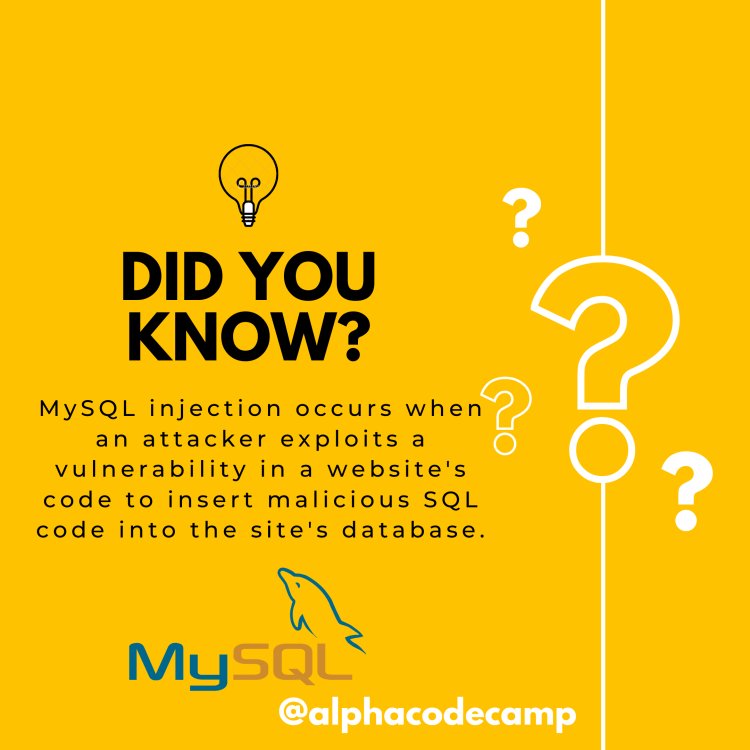What is MySQL Injection
MySQL injection is a type of security vulnerability that allows attackers to inject malicious SQL statements into a website's database, potentially gaining access to sensitive information or even taking control of the website. In this article, we'll explain how MySQL injection works and how to prevent it.

Table of contents
MySQL injection is a type of security vulnerability that allows attackers to inject malicious SQL statements into a website's database, potentially gaining access to sensitive information or even taking control of the website. In this article, we'll explain how MySQL injection works and how to prevent it.
What is MySQL injection
MySQL injection occurs when an attacker exploits a vulnerability in a website's code to insert malicious SQL code into the site's database. The SQL code can then be used to manipulate or extract data from the database, potentially giving the attacker access to sensitive information such as passwords, credit card numbers, or other confidential data.
MySQL injection attacks can be very dangerous because they can be difficult to detect and can give attackers access to a wide range of sensitive data. In some cases, they can even allow attackers to take control of the entire website, or to use the website as a launching pad for further attacks.
How MySQL Injection Works
MySQL injection attacks usually start with an attacker identifying a vulnerable website that uses a MySQL database. The attacker then looks for a way to exploit the vulnerability, typically by manipulating user input fields such as search boxes or login forms.
For example, an attacker might enter a malicious SQL statement into a website's search box, such as:
' OR '1'='1
This statement is designed to trick the website's SQL database into treating the attacker's input as a legitimate command, allowing the attacker to extract data from the database or even modify its contents.
Another common approach is to use what's known as a "blind" SQL injection attack, which involves exploiting a vulnerability in the website's error messages to extract information from the database. In a blind SQL injection attack, the attacker typically sends a series of carefully crafted SQL statements to the website, looking for errors or other responses that can reveal information about the database's structure or contents.
How to Prevent MySQL Injection
Preventing MySQL injection attacks requires a multi-layered approach that involves both coding best practices and robust security measures. Here are some key steps you can take to protect your website from MySQL injection attacks:
1. Use Parameterized Queries: One of the most effective ways to prevent MySQL injection attacks is to use parameterized queries in your website's code. Parameterized queries use placeholders to represent user input, preventing attackers from manipulating SQL statements directly. This can make it much more difficult for attackers to exploit vulnerabilities in your website's code.
2. Input Validation: Another key step is to use input validation to ensure that user input is properly formatted and free of malicious code. This can include techniques like form field validation, input filtering, and using whitelists to restrict the types of input that your website accepts.
3. Limit User Privileges: It's also important to limit the privileges of user accounts in your MySQL database. This can help prevent attackers from using SQL injection attacks to gain access to sensitive data or modify your database's contents.
4. Use Prepared Statements: Prepared statements are another effective way to prevent MySQL injection attacks. Prepared statements separate the SQL query from the user input, making it more difficult for attackers to manipulate the SQL code directly.
5. Keep Software Up-to-Date: Finally, it's important to keep all software used in your website, including the MySQL server, up-to-date with the latest security patches and updates. This can help prevent attackers from exploiting known vulnerabilities in your software.
In conclusion, MySQL injection is a serious security vulnerability that can have wide-ranging consequences for your website's security and reputation. By following best practices like using parameterized queries, input validation, and limiting user privileges, you can help protect your website from these types of attacks and keep your data and users safe.














